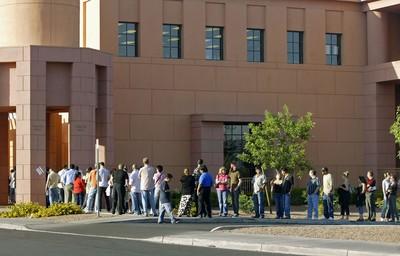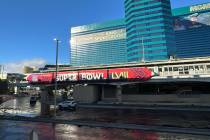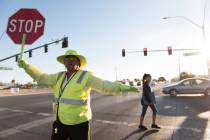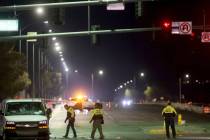Throwing Book At Drunken Drivers
If you want to get a handle on how big the drunken driving problem is in Southern Nevada, take an afternoon trip to the Clark County Library's East Flamingo Road branch on the third Wednesday of any month.
On Wednesday this past week, snaking around the building was a line hundreds of people long, filled with folks young and old, wearing ties and tie-dyes, preppy and poor.
They all had one thing in common: They were recently convicted of drunken driving.
The convicts were there to attend a court-ordered victim impact panel that eventually filled a 400-seat auditorium and a 100-seat room set aside for a Spanish-language presentation.
Organizers even had to open up an overflow room for a handful of stragglers without seats.
"That's just the ones who were caught" and convicted without having killed anybody, said Sandy Heverly, executive director of Stop DUI, an advocacy and assistance group running the presentation. "That's what's frightening."
Do the math. Those 500-plus people, the usual monthly attendance, are just one month's worth of convictions in Southern Nevada. That comes out to almost 17 people a day, or one DUI conviction every 86 minutes or so. And Heverly notes the typical drunken driver gets away with it dozens of times before getting caught.
There's no typical convict.
"Every age. Every ethnic background. Every economic background. Pregnant women, which is always amazing," Heverly said. "We have two of those in line."
The panel is just one of a number of hoops DUI convicts must jump through. Community service work, driver's license suspensions and at least a few hours in jail are part and parcel of what the typical first-timer faces.
Offenders heard from a heartbroken mother who shared the loss of her son to a drunken driver; a crippled former highway patrolman who talked about losing the life he once had to a behind-the-wheel drunk; and gross-out pics of a woman badly burned when her car exploded in a crash caused by a drunk. You know, the "Scared Straight" approach.
The show appeared to hold the attention of one man clad in a T-shirt illustrated with drink glasses and the phrase "It's Five O'Clock Somewhere." Nearby, a man wearing overalls seemed to be nodding off.
Another man, having ignored a preemptive warning, was kicked out after his cell phone began to ring. And yet another guy didn't make it in at all, according to Heverly. He reeked of booze, and a quick test found his blood-alcohol level was 0.26, more than three times the legal limit. Since it was determined he hadn't driven himself to the meeting, he was simply kicked out.
Others who showed up sober found the experience sobering.
"It's pretty humiliating," said a small-business owner in his 20s, one of a number of first-time offenders who spoke with me on the condition of anonymity. "But everybody's in the same boat."
Some thought the boat should be named the S.S. Overkill.
"They shouldn't make you do this for a first offense. The whole thing is unfair," one woman in her 30s said as she stood in line.
She said she lost her job because of a related 90-day license suspension.
Agreed, said a woman in her 50s who works in a bank. "I say, 'I have 30 years (driving) without even a parking ticket,' and they say, 'Too bad. It's a DUI,'" she said.
Another woman, in her 40s and working in the mortgage industry, said her arrest was "a waste of time and a waste of money," but her fault and an effective deterrent.
The woman said she has spent around $6,000 so far on attorney's bills, fines and court costs.
"I think by doing this, it makes me not do it again," she said. "I'm so scared to drive now, to get pulled over for anything."
A man in his 50s who works in the casino industry said his arrest has had one upside. "The good point is, I quit drinking," he said.
And a retiree in his 70s said the punishment was "fair."
"The main thing is you have to pay the money. That's what they're after," he said. "If you don't have the money, you're going down."
Indeed, convicts pay $50 each to attend the panel. That money underwrites financial aid to drunken driving victims and their families, according to Heverly.
But the retiree added the total monetary cost of a DUI is a strong, if harsh, motivator to stay clean when cruising.
"This kind of money teaches you a lesson more than anything else. How many people can pull out $3,500 (for fines and fees)?" he said. "It's a humiliating experience and an expensive experience."
Heverly isn't sure it's humiliating enough. If it was, the Flamingo library wouldn't be hosting 500 people a month.
"It tells me the stigma of DUI has dissipated, and we need to focus on the violent crime of DUI and make sure it's addressed and treated with a very significant stigma attached," she said.
Besides, panel attendees were the lucky ones, Heverly said. They weren't Ronald Jayne Jr., the 19-year-old man who police say was drunk when he smashed his speeding pickup into an SUV, killing five people May 5 in Las Vegas.
If convicted, Jayne faces years in prison.
Among the convicts, "every single person out there is a potential killer" if left to drive drunk, Heverly said.
Do the panels work?
Heverly thinks so. She said a two-year review of county court records show that more than nine of every 10 drivers attending the victim impact panels haven't had a repeat DUI to date.
As for the remaining one out of 10, they're a hard-core group, either unable to break an addiction or simply unwilling to change.
"The only thing we can hope is when they're driving under the influence, they only kill themselves or find some help," Heverly said.
Or you might see them at the Flamingo library on the third Wednesday of next month.
If you have a question, tip or tirade, call the Road Warrior at 387-2904, or e-mail him at roadwarrior@reviewjournal.com or OSofradzija@reviewjournal.com.
ROAD WARRIORMORE COLUMNSDiscuss this column in the eForums!
Traffic on northbound Interstate 15 at Silverado Ranch Boulevard will face overnight lane reductions and be diverted off and back onto the freeway at that interchange between 8 p.m. and 5 a.m., Monday night through Friday morning to allow girder placement work on a new bridge there. Drivers are advised to use traffic controls as directed. Engineers will close Decatur Boulevard at Blue Diamond Road (state Route 160) from 4 a.m. Wednesday through 5 a.m. Thursday to allow road reconstruction work. During that time, drivers will not be able to access Decatur from Blue Diamond. Drivers are advised to follow posted detours to avoid the construction area. Drivers can expect lane reductions on northbound Jones Boulevard between U.S. Highway 95 and Charleston Boulevard today between 9 a.m. and 5 p.m. to allow concrete repair work. Starting Tuesday, drivers can expect intermittent lane closures on Interstate 15 at Mojave Drive in Victorville, Calif., to allow interchange reconstruction work. The project is expected to last through early 2009. Commuters can sign up for weekly project e-mail updates by going online to www.caltrans8.info, and clicking on "CT Connect" for I-15 work.






















